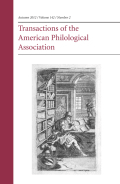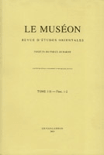
Cuadernos de Filologia Clasica-Estudios Griegos e Indoeuropeos
metrics 2024
Connecting the Past with Contemporary Scholarship
Introduction
Cuadernos de Filologia Clasica-Estudios Griegos e Indoeuropeos, published by Universidad Complutense de Madrid, serves as a vital platform in the fields of Classics and Linguistics. With an ISSN of 1131-9070 and an E-ISSN of 1988-2637, this journal showcases rigorous academic research that spans both Greek studies and Indo-European linguistics. Recognized within the Q1 quartile in Classics and the Q2 quartile in Linguistics and Language, it highlights its standing among peers in these disciplines, particularly reflecting its commitment to advancing scholarly conversation. Though currently lacking in Open Access options, its emphasis on quality content ensures it maintains an intellectual influence, as evidenced by its ranking of #112 in Classics and efforts to engage researchers and students alike. The journal's coverage from 2011 to 2024 positions it as a rich historical resource, while its address in Madrid places it at the heart of European classical studies. By offering insights into the fundamental aspects of language, literature, and ancient cultures, Cuadernos de Filologia Clasica remains a critical resource for those seeking to deepen their understanding of the classical world and its enduring linguistic legacies.
Metrics 2024
 0.17
0.17 0.10
0.10 0.10
0.10 5
5Metrics History
Rank 2024
Scopus
JCI (Web Of Science)
Quartile History
Similar Journals

Transactions of the American Philological Association
Connecting Past and Present through Scholarly ExcellenceTransactions of the American Philological Association, published by Johns Hopkins University Press, is a leading academic journal dedicated to advancing the study of classics, linguistics, and literary theory. With an impressive impact factor solidified by its 2023 rankings—Q1 in Classics and Literature and Literary Theory, and Q2 in Linguistics and Language—this journal stands as a pivotal resource for scholars and practitioners in the humanities. The journal boasts a rich history of published research dating back to 2002, providing insights that address both contemporary and historical inquiries within its fields of study. Although it does not follow an Open Access model, its rigorous peer-review process ensures high-quality contributions that are essential for those engaged in advanced research. With an extensive reach, reflected in its robust Scopus rankings, Transactions of the American Philological Association plays an indispensable role in shaping the discourse for academics and students alike.

ACME-Annali della Facolta di Studi Umanistici dell Universita degli Studi di Milano
Enhancing academic engagement through open dialogue.ACME-Annali della Facoltà di Studi Umanistici dell'Università degli Studi di Milano is a distinguished open-access journal, published by UNIV STUDI MILANO, that has been providing a platform for scholarly discourse in the humanities since 2014. With its ISSN 0001-494X and E-ISSN 2282-0035, this journal is dedicated to fostering critical analysis and innovative thought in areas such as literature, philosophy, history, and cultural studies. Situated in the heart of Milano, Italy, and addressing a global audience, ACME aims to promote interdisciplinary dialogue and contribute to the advancement of humanistic inquiry. By facilitating free access to high-quality research, the journal underscores the importance of disseminating knowledge to enable broader academic engagement. With an emphasis on rigor and relevance, ACME is an essential resource for researchers, professionals, and students seeking to deepen their understanding of the humanities.

Boletim de Estudos Classicos
Exploring the Depths of Classical KnowledgeBoletim de Estudos Clássicos is a distinguished scholarly journal dedicated to the field of Classics and Education, published by COIMBRA UNIV PRESS. Since its transition to an open-access format in 2013, the journal has aimed to broaden the accessibility of high-quality research and critical discussions within these disciplines. Despite its current categorizations in the Q4 quartile for both Classics and Education, the Boletim has a unique opportunity to serve as a platform for emerging voices and innovative research, fostering growth in an otherwise underrepresented area. Based in Portugal, the journal invites contributions that encompass a wide range of topics, from ancient texts and historical analysis to educational methodologies and pedagogy. With an ISSN of 0872-2110 and an E-ISSN of 2183-7260, the journal actively seeks to attract researchers, professionals, and students dedicated to the exploration of classical studies. The journal's address is RUA DA ILHA, NO 1, COIMBRA 3000-214, PORTUGAL, where its contributors and editorial board strive to inspire a deeper understanding of classical heritage and its relevance to contemporary education.

Acta Classica
Advancing Scholarship in Classical Languages and LiteratureActa Classica is a distinguished journal dedicated to the field of Classics, published by the Department of English in Classical Languages at the University of Free State, South Africa. With its ISSN 0065-1141 and E-ISSN 2227-538X, this journal has been a pivotal platform for scholarly discourse since its inception in 1973, notably converging and evolving significantly in its content from 2010 to 2023. Although it currently holds a Q4 classification in Classics, its Scopus ranking at #88 out of 170 in the Arts and Humanities reflects its relevance in academic circles, with a 47th percentile standing. The journal aims to publish high-quality research articles, reviews, and critical essays that not only explore the rich tapestry of ancient civilizations but also contribute to contemporary understandings of classical languages and literature. While its content is not openly accessible, Acta Classica remains an essential resource for researchers, professionals, and students who seek to deepen their knowledge and engagement with Classical studies.

Cahiers des Etudes Anciennes
Exploring the Depths of Ancient CivilizationsCahiers des Etudes Anciennes is a distinguished scholarly journal dedicated to the field of Classics, published by Université du Québec à Trois-Rivières. With its ISSN 0317-5065 and E-ISSN 1923-2713, this journal has been a vital platform for the dissemination of research since its inception in 1976, achieving Open Access status in 2006 to enhance accessibility and encourage wider readership. Operating from Canada, specifically Trois-Rivières, Quebec, this journal has cultivated an academic environment that fosters critical dialogue among classics scholars. With a Scopus ranking of 94 out of 170 in the Arts and Humanities - Classics category, placing it in the 45th percentile, it currently holds a Q3 quartile ranking, highlighting its growing influence in the academic community. Cahiers des Etudes Anciennes aims to publish high-quality research articles, reviews, and essays that contribute to the understanding of ancient civilizations, texts, and cultures, making it an invaluable resource for researchers, professionals, and students alike looking to explore the depths of classical studies.

Museon
Engaging Minds Through Innovative AnalysisMuseon, published by PEETERS in Belgium, is a prominent academic journal dedicated to exploring the interconnected realms of History, Linguistics, Literature, and Religious Studies. With an ISSN of 0771-6494 and an E-ISSN of 1783-158X, this journal has been a reliable source of scholarly discourse since its inception in 1972, with coverage extending from 1976 to 2023. While the journal does not offer open access, it maintains a respectable reputation, as evidenced by its category quartile rankings in 2023, positioning it in Q2 for Literature and Literary Theory and Q3 for the other disciplines. Researchers and students in these fields will find Museon to be an essential platform for disseminating and engaging with innovative and critical analyses. The journal's commitment to high-quality scholarship is reflected in its diverse scope and its ongoing contribution to the humanities, making it a vital resource for advancing knowledge and fostering academic dialogue.

Antichthon
Bridging Past and Present in Classical ResearchAntichthon, published by Cambridge University Press, stands as a vital platform within the field of Classics. Established in 1986, the journal has evolved to encompass scholarly contributions that explore various dimensions of classical studies, including literature, history, and cultural studies. With its rich publication history extending from 2011 to 2023, Antichthon boasts a commendable Q2 ranking in the latest 2023 Category Quartiles for Classics, reflecting its significant impact in the academic community. Although the journal does not offer an Open Access option, it continues to engage researchers and academics with its curated selection of articles, reviews, and critical insights. Located at the Edinburgh Building, Shaftesbury Rd, Cambridge, England, this journal remains an essential resource for both established scholars and students aiming to deepen their understanding of classical antiquity and its enduring relevance.

Eikasmos-Quaderni Bolognesi di Filologia Classica
Empowering Scholars in the Realm of ClassicsEikasmos-Quaderni Bolognesi di Filologia Classica is a distinguished journal that focuses on the fields of Classics, Linguistics, and Language, published by PATRON EDITORE S R L in Italy. With its ISSN 1121-8819, the journal has been a vital platform for the dissemination of scholarly work from 2011 until 2021, contributing significantly to the dialogue within these disciplines. Although recognized in the lower quartiles (Q4) of various categories within Scopus, including Classics and Linguistics, and having ranked in the 37th and 19th percentiles respectively, Eikasmos stands as an invaluable resource for researchers, academics, and students committed to exploring classical philology and its interconnections with modern linguistic studies. The absence of an open access model underscores the importance of institutional support in accessing this scholarly work, which continues to enrich the academic landscape of classical studies.

MNEMOSYNE
Advancing the frontiers of humanities scholarship.MNEMOSYNE is a prestigious academic journal published by BRILL, specializing in the fields of Archeology, Classics, History, Linguistics and Language, and Literature and Literary Theory. With a remarkable history dating back to its inception in 1948, this journal continues to be a crucial resource for scholars and researchers, spanning its publication years that extend to 2024. The journal boasts high rankings in multiple categories according to Scopus, including Q1 status in Classics and History, reflecting its impact and relevance in the academic community. Although it is not an Open Access journal, its selection of peer-reviewed articles ensures rigorous scholarship that contributes to ongoing discussions and discoveries in the humanities. By providing a platform for innovative research and critical discourse, MNEMOSYNE plays an integral role in advancing the understanding of cultural and historical contexts, making it an essential read for both seasoned academics and emerging scholars alike.

Rivista di Filologia e di Istruzione Classica
Unveiling the Rich Tapestry of Classical TextsRivista di Filologia e di Istruzione Classica is a distinguished academic journal published by LOESCHER EDITORE, dedicated to advancing the fields of Classics and Linguistics. Based in Italy, this journal serves as a vital platform for original research, critical analysis, and scholarly discussions that enrich our understanding of classical texts and educational methodologies in the humanities. With its unique focus on the intricate relationship between classical literature and language, the journal aims to facilitate discourse among researchers, educators, and students alike. Although categorized in the fourth quartile in both Classics and Linguistics, it provides an essential venue for scholars seeking to disseminate their findings and engage with contemporary academic debates. The journal is indexed in various databases, though recent coverage in Scopus has been discontinued. Researchers interested in exploring the complex layers of classical philology and instructional practices are encouraged to contribute to and engage with the innovative scholarship presented in this journal.